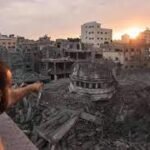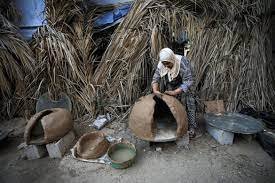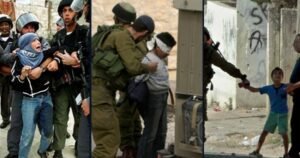Gaza, a fading land?
Gaza a fading land of mass graves, hospital sieges, dying families, over 13,000 people already dead in the war torn city. More than 2 million people are displaced, and families torn apart.
Children’s inadequate diets, the number of people living in Gaza’s overcrowded shelters, rainfall, and the lowering temperatures all combine to create a “perfect storm for large-scale epidemics among this population.”
Standing over several dozen bodies that had been discovered following a flurry of Israeli airstrikes that struck two refugee camps on Monday, mourners in central Gaza performed funeral prayers.
The deceased were placed on the ground in the city of Deir Al Balah, wrapped in white sheets and improvised plastic body bags. Numerous people are still missing, according to medics, and are thought to be buried or trapped behind the rubble of several buildings that have collapsed.

Near damaged steel reinforcing bars, locals at the bombing scene sat in small groups amid the debris. The bodies that were retrieved were loaded onto a truck and buried close by.
“Home is behind, the world ahead,
And there are many paths to tread
Through shadows to the edge of night,
Until the stars are all alight.
Then world behind and home ahead,
We’ll wander back and home to bed.
Mist and twilight, cloud and shade,
Away shall fade! Away shall fade!” – J. J. Tolkein
Gaza Hospitals turned over
According to a doctor who used to work at al-Shifa Hospital in Gaza City, it is “the darkest day” in the institution’s existence. Palestinian officials claim that in response to an Israeli military order, patients, medical personnel, and displaced individuals were evacuated from the compound.
For days, Israeli forces besieged and plundered the hospital, leaving the patients, staff, and internally displaced people without fuel, food, water, or medical supplies. The biggest hospital in the Gaza Strip has been transformed into a mass grave.
The director general of the UN organization confirmed that El Arish, 28 of the 31 babies that were evacuated from are in Egypt. They’ve sent twelve of them to Cairo.
Today, 28 of the 31 premature babies, who were evacuated from the Al-Shifa hospital yesterday, were safely transferred in Al-Arish to receive medical treatment in #Egypt. From there, 12 babies were flown to Cairo.
Three babies continue to receive treatment at the Emarati… pic.twitter.com/SZjKbRUojJ
— Tedros Adhanom Ghebreyesus (@DrTedros) November 20, 2023
A hospital in northern Gaza that was the scene of combat between Israeli soldiers and Hamas terrorists on Monday had some 200 people evacuated.
The International Committee for the Red Cross and the UN organized a rescue operation that saw the evacuees from Indonesian Hospital transported to southern Gaza, according to Ashraf al-Qudra, a spokesman for Hamas’ Health Ministry. He mentioned that al-Nasser hospital in Khan Younis is treating a large number of the injured evacuees.
At the Indonesian Hospital, between 400 and 500 additional injured individuals are still there, according to al-Qudra in an interview with Al-Jazeera. According to the Health Ministry and a hospital employee, a shell impacted the hospital’s second floor, killing twelve people, thus prompting the evacuations.

The World Health Organization is attempting to get in touch with the Indonesian hospital in response to local allegations of gunshots and bombs.
“We are attempting to establish a communication channel with the hospital in order to ascertain the current condition of the patients,” stated Rob Holden, the senior emergency officer for the WHO, at a press conference held at the UN in Gaza. “No direct information from anybody inside the hospital of the current status,” he claimed, is available to the group. Holden stated, “We currently know that the hospital has 700 patients and staff members.”
Scarcity Of Food and Fuel
The Gazan people have turned towards traditional methods in the midst of the Israeli war and experiencing fuel and energy outages, as they look for ways to cook what little they have or bake bread.
Due to a lack of fuel, the sole mill in the Gaza Strip is unable to process wheat following Israel’s complete embargo of the area.
Inshirah Salem al-Aqra, 53, has long been crafting these ancient clay ovens for anyone who requests one. The oven is hand-molded into shape using clay, animal dung, and straw, then allowed to dry in the sun.

In addition to cooking meals and making coffee and tea, the ovens are utilized for baking bread.
Since there have been widespread shortages of gas and fuel during the conflict, there has been a rise in demand for conventional ovens.
Fuel shortages forced the removal of the babies off life support at Al-Shifa, where they were all battling illnesses, according to a WHO assessment. They were initially brought to the neonatal intensive care unit at Al-Helal Al-Emarati Maternity Hospital in the southern Gaza Strip after being evacuated.
The organization confirmed that it is “deeply concerned about the safety and health needs of patients and health workers who remain at Al-Shifa Hospital” and claimed that the ongoing hostilities, in addition to a lack of clean water, fuel, food, and medical supplies, have rendered the medical complex unusable.
Israeli forces attacked two houses yesterday, resulting in the deaths of over twenty Palestinians and several injuries. The airstrikes carried on northward, with an additional attack on a UN school in al-Falouja and bombardment of three buildings in the Jabalia refugee camp. Israel is increasing up its bombing of the area around the Kamal Adwan Hospital and the Indonesian Hospital in the northern Gaza Strip.
Truce with ‘Israel’ lies ahead
A senior Hamas source told NBC News on Monday that talks between Israel and the Palestinian militant organization Hamas are still going on regarding the release of hostages. Spokesman Osama Hamdan stated, “We were several times close and they undermined the whole process.” Although specific terms were still elusive, a number of U.S. officials have hinted that progress toward the release of the 237 Hamas hostages may be made in the next several days.
U.S. Deputy National Security Advisor Jonathan Finer stated on CNN’s “State of the Union” on Sunday, “We think that we are closer than we have been, perhaps at any point since these negotiations began weeks ago.” In the past, Hamas and Israel have reached deals on humanitarian supplies and captive releases through the mediation of Qatar, Egypt, and the United States. But the objectives of the two sides continue to be at odds with one another: though Hamas officials have previously stated that such an amnesty is a requirement for the release of captives, Israel refuses to talk about a cease-fire in the Gaza Strip until the hostages are returned.

Approximately 5,200 Palestinians were detained in Israeli prisons prior to October 7. Since then, Israeli soldiers have conducted daily raids throughout the occupied West Bank and occupied East Jerusalem, apprehending at least 2,960 additional people. At least 95 women and 37 journalists are among them. The majority of the detainees are kept under laws and military directives that permit imprisonment without charge or trial. 145 of them are children, at least, rights and monitoring organizations claim. Currently, 26 children are being kept in administrative detention out of over 200 children detained in Israeli jails.












Comments 1